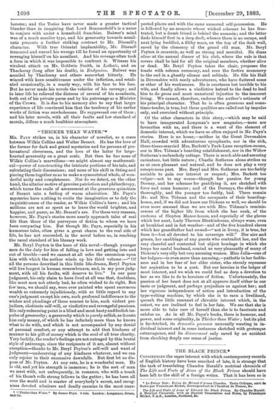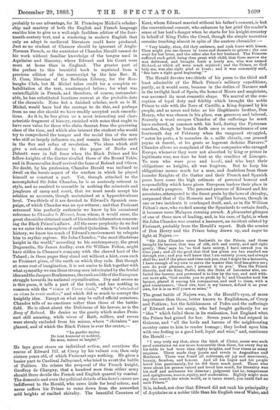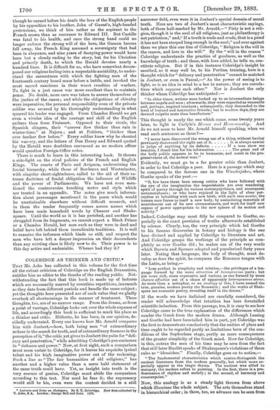THE BLACK PRINCE.* CONSIDERING the eager interest with which contemporary
records of English history have been searched of late, it is strange that the task of translating Chandos Herald's metrical chronicle of The Life and Feats of Arms of the Black Prince should have been left to the skill of a foreign writer. That it has been so is
* Le Prince Noir : Pointe du Herald d'Armes Chandos. Texte Critique, marl de Notes par Francisque Michel, Correspondent de PInstitnt de France, &c.
The Life and Feats of Arms of Edward the Black Prince. By Chandos Herald. A Metrical Chrnuicle, with an English Translation and Notes, by Francieene Michel, F.A.S., London, Scotland, 4be. probably to our advantage, for M. Francisque Michel's scholar- ship and mastery of both the English and French language enables him to give us a well-nigh faultless edition of the four- teenth-century text, and a rendering in modern English that only an adept in medimval literature could have produced. Just as no student of Chaucer should be ignorant of Anglo- Norman French, so the annotator of Chandos Herald cannot do his work without familiar knowledge of the tongue used in Aquitaine and Gascony, where Edward and his Court were more at home than in England. The greater part of the preface to this beautiful book is reprinted from a previous edition of the manuscript by the late Rev. H. 0. Coxe, librarian of the Bodleian Library, for the Rox- burghe Club, but M. Michel takes credit for a complete re- habilitation of the text, unattempted before; for what was unintelligible in French, and therefore, of course, untranslat- able, he has substituted locutions current at the probable date of the chronicle. None but a finished scholar, such as is M. Michel, would have had the courage to do this, and perhaps from no one else should we have readily accepted such emenda- tions. As it is, he has given us a most interesting and char- acteristic fragment of history, enriched with notes that ought to have rare value for those who claim descent from the governing class of the time, and which also interest the student who would try to comprehend the temper and the social ties of the men who still so largely influence us, and remain like basaltic reefs in the flux and reflux of revolution. The ideas which still give a sub•sacred flavour to the pages of Burke and Debrett were in full force when the Black Prince and his fellow-knights of the Garter rivalled those of the Round Table, and in Ronceavalles itself revived the fame of Roland and Oliver. No doubt, by his profession, Chandos Herald was inclined to dwell on the heroic aspect of the warfare in which he played himself so constant a part. Yet, though attached to the accomplished Sir John Chandos, he is so austerely reticent in style, and so resolved to resemble in nothing the minstrels and jonglenrs of camp and court, that we must needs accept his relation as accurate, though maintained at a hyperchivalrous level. Two-thirds of it are devoted to Edward's Spanish cam- paign, of which Chandos was an eye-witness ; and that Froissart esteemed him perfectly authentic we know by his occasional reference to Chandos is IRraut, from whom, it would seem, the great chronicler obtained much of his minute information concern- ing the Black Prince's affairs. All the more perplexity do we feel as we enter this atmosphere of rarified Quixotism. We touch real history, we know too much of Edward's environment to• relegate him to mythic regions. Sir John Chandos," the most illustrious knight in the world," according to his contemporary, the great Duguesclin, Sir James Audley, even Sir William Felton, might have ridden in Chaucer's company with the shrewd host of the Tabard ; in these pages they stand out without a hint, even such as Froissart gives, of the earth on which they rode. But though at some cost of imagination, it is not amiss to link together with what sympathy we can these strong men intoxicated by the feudal idea and the Jacques Bonhommes, the rank and file of the European struggle towards its national crystallisation. Dry and severe as is this poem, it tells a part of the truth, and has nothing in common with the " rimes et livres limes," which "n'ataindent en rims la vraie matere," and which did so much to corrupt the knightly idea. Except on what may be called official occasions, Chandos tells of no emotions softer than those of the battle- field. He is silent about the Dulcineas of his heroes, as is the Song of Boland. He denies us the gossip which makes Frois- sart still amusing, while wives of Bath, millers, and reeves were sternly excluded from his mirror, where " chivalers " are glassed, and of which the Black Prince is ever the centre,— •
" La parfite racine De tout honnour et noblete, De seas, valour et largite."
He lays great stress on individual action, and mentions the rescue of Edward M. at Crecy by his valiant son, then only sixteen years old, of which Froissart says nothing. He gives a busier part to Cardinal Jalleyrand, who tried to avert the battle of Poitiers. He relates the proposal of the French knight, Geoffroy de Chargny, that a hundred men from either army should there decide the French and English quarrel by combat. The domestic and even the political details of his hero's career are 'indifferent to the Herald, who cares little for local colour, and never suffers his Prince to come down from the somewhat arid heights of exalted chivalry. The beautiful Countess of Kent, whom Edward married without his father's consent, is but the conventional consort, who enhances by her grief the reader's sense of her lord's danger when he starts for his knight-errantry in behalf of King Pedro the Cruel, though the simple narrative remains touching almost in spite of the austere chronicler :-
" Very kindly, then, did they embrace, and took leave with kisses. Then might you see dames in tears and damsels to grieve ; the one wept for her lover, and the other also for her husband. The Princess suffered such grief, being then great with child, that from sorrow she Was delivered, and brought forth a lovely son, who was named Richard, at which all were much rejoiced ; and the Prince, so God help me, was also right glad at heart ; and it was commonly said, See here a right good beginning.' "
The Herald devotes two-thirds of his poem to the third and least admirable of the Black Prince's military expeditions, partly, as it would seem, because in the defiles of Navarre and in the twilight land of Spain, the home of Moors and magicians, war assumed its most romantic shape. We marvel at the con- ception of loyal duty and fidelity which brought the noble Prince to side with the Nero of Castille, a King deposed by his people, and as mean and false as his illegitimate brother, Don Henry, who was chosen in his place, was generous and beloved. Scarcely a word escapes Chandos of the sufferings he must have endured, in common with his lord, during the Pyrenean marches, though he breaks forth once in remembrance of one fourteenth day of February when the vanguard struggled, " outre les portz, a la noumbre de x. mille chivalx, one graund peyne et durete, et les gentz se logerent dedeinz Navarre." Chandos allows no complaint of the free companies who ravaged Europe, whenever they were not absorbed by king or prince in legitimate war, nor does he hint at the cruelties of Limoges. To men who were prus and Nardi, and who kept their obligations as knights, all was forgiven. But to keep his obligations means much for a man, and doubtless from these founder Knights of the Garter and their French and Spanish peers have come the high estimate of personal honour and responsibility which have given European leaders their place in the world's progress. The personal prowess of Edward and his associates, attempered to the finest grain by the laws of chivalry-, surpassed that of the Homeric and Virgilian heroes, though in one or two incidents it overleaped itself, and, as in Sir William Felton's case, who rushed among the Spaniards to certain death, it becomes mere Malayan running amuck. A pleasanter glimpse of one of these men of leading, and, in his case, of light, is when Sir John Chandos was created a banneret, an incident related by Froissart, probably from the Herald's report. Bqth the armies of Don Henry and the Prince being drawn up, and eager to fight at Najera
:- "Sir John Chandos came forthwith to the Prince, and there brought his banner, that was of silk, rich and costly, and said right gently, Sire,' says he, 'so God have mercy, I have served you in time past; and all the good that God has given me has reached me through you ; and you well know that I am entirely yours, and always shall be; and if the place and time suit you, that I might be a banneret, I have enough of my own to serve the master that God has given me ; now do your pleasure, see, I present it to yon.' Then the Prince directly, and the King Pedro, with the Duke of Lancaster also, un- furled the banner, and presented it to him by the top, and said with- out more ado, ' God enable you to profit by it,' and Chandos took his banner, placed it among his companions, and said to them, with a glad countenance, ' Good sirs, here is my banner, defend it as your own, for it is as well yours as mine.' "
The great battle of Najera was, in the Herald's eyes, of more importance than those, better known to Englishmen, of Crecy and Poitiers ; but the faithlessness of Pedro and the sufferings of Edward and his army, who had fought gallantly for an " idea " which failed them in its realisation, lost England what the Prince had gained for her. Seven years he had reigned in Guienne, and "all the lords and barons of the neighbouring country came to him to render homage ; they looked upon him with one feeling as a good lord, loyal and wise," and, continues the Herald :-
" I may truly say that, since the birth of Christ, never was such good entertainer nit nor more honourable than these, for every day at his table he had -Dore than eighty knights, and four times as many esquires. There made they jousts and revels in Angouleme and Bordeaux. There was found all nobleness, all joy and merriment, bounty, freedom, and honour. And all his lieges and his people loved bim passionately, for he did them much good. Those who were about his person valued and loved him much, for liberality was his staff and nobleness his director ; judgment had he, temperance and uprightness, reason, equity, and moderation. Rightly might men say that search the whole world, as it turns round, you could find no such Prince."
It is, indeed, not clear that Edward did not rank his principality of Aquitaine as a nobler title than his English one of Wales, and though he earned before his death the love of the English people by his opposition to his brother, John of Gaunt's, high-handed pretensions, we think of him rather as the aspirant to the French crown than as successor to Edward III. But Castille was fatal to his health, and once the strong hand could no longer enforce the strong will of the hero, the Gascon barons fell away, the French King assumed a sovereignty that had been in abeyance, and nine years of decaying power would have been but a cloudy ending to the story, but for his Christian and princely death, to which the Herald devotes nearly a hundred lines. It is difficult for us, who have somewhat decom- posed our religious feeling into a respectable amiability, to under- stand the earnestness with which the fighting men of the fourteenth century heard mass before a battle, and invoked the most sacred sanctions in their worst cruelties of warfare. To. fight in a just cause was more excellent than to maintain peace. No doubt, more care was taken to assure themselves of the justice of the cause ; and while the obligations of chivalry were imperative, the personal responsibility even of the private soldier was secured by his thoroughly understanding in what quarrel his leader was engaged. From Chandos Herald we get even a vivider idea of the courage and skill of the English archers than from Froissart. Opposed to their rivals, the Spanish slingers, their "arrows flew thicker than rain in winter-time," at Najera ; and at Poitiers, " thicker than over feather flew before." Every soldier knew why he shouted his war-cry, and the letters of Don Henry and Edward quoted by the Herald. were doubtless canvassed as no modern officer would question Foreign-Office notes.
There is much to learn in this interesting book. It throws a side-light on the rival policies of the French and English Kings. The courts of Paris and Avignon, undermining the feudal hierarchy, while those of Bordeaux and Westminster, with singular short-sightedness, called to the aid of their ex- treme doctrines of feudal obligation the influence of Wicliffe and the power of Parliaments. We have not even men- tioned the controversies touching metre and style which are treated in an appendix. The notes give much informa- tion about personages mentioned in the poem which would be unattainable elsewhere without difficult research, and in them the reader frequently comes across names which have been made household words by Chaucer and Shake- speare. Until the world as it is has perished, and another has struggled from its fragments, we cannot expect a Black Prince Dr a Chandos Herald, but men such as they were in deed and belief have left behind them ineradicable traditions. It is well to examine the influence which binds us still, and respect the men who have left a deeper impression on their descendants than any existing class is likely now to do. Their power is to this day active and undeniable. Whence had they it P




































 Previous page
Previous page